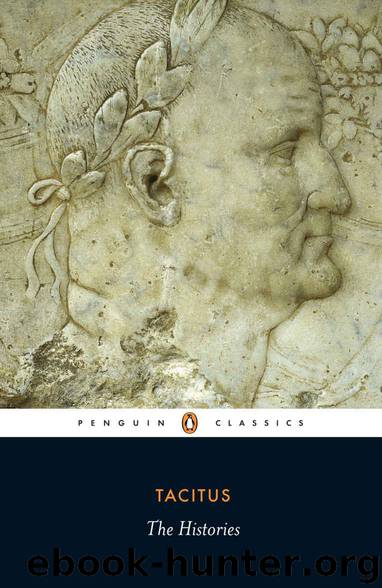The Histories (Penguin Classics) by Tacitus

Author:Tacitus
Language: eng
Format: azw3
ISBN: 9780141942483
Publisher: Penguin Books Ltd
Published: 2009-06-24T16:00:00+00:00
The Flavian March on Rome
49. So in a convulsion felt around the world, imperial power changed hands. Meanwhile, the behaviour of Antonius Primus degenerated sharply after Cremona. He thought that he had done enough to settle the war and that the rest would be easy – or perhaps, in a character like his, it needed success to reveal his greed, pride and other hidden vices. He pranced through Italy as if it were a conquered country, ingratiated himself with the legions as if they were his own, and in everything he did and said prepared his route to power. To give the troops a taste for licence, he allowed the legions to appoint replacement centurions for those who had been killed. Their votes selected all the most unruly types. The soldiers were no longer under the control of their generals: it was the generals who were swept along by the violent whims of the soldiers. These were seditious methods which were bound to ruin good discipline, and Antonius soon exploited them to enrich himself. Mucianus was approaching, but Antonius was not at all afraid, despite the fact that this was a more deadly mistake than if he had scorned Vespasian himself.55
50. However, as winter approached and the Po valley became waterlogged, his column marched along without heavy baggage. At Verona they left the main parties of the victorious legions, the wounded soldiers or those too old for action and a number of fit soldiers as well. It was thought that the auxiliary cohorts, cavalry and some specially chosen legionaries would be sufficient, as the war was by this time practically won. The Eleventh Legion had now joined the advance. It had hesitated at first, and then, when things turned out well, became uneasy because of its failure to cooperate. It was accompanied by a recent levy of 6,000 Dalmatian recruits. This whole force was led by the consular governor, Pompeius Silvanus, although real power lay with Annius Bassus, the legionary commander. Silvanus, too lazy for war, frittered away the time for action in talk, but Bassus knew how to manage him by a show of deference, and whenever there was work to be done he was always on the spot and ready to act with quiet efficiency. These units were reinforced by the pick of the naval personnel at Ravenna, who were eagerly demanding service in the legions.56 Dalmatians made up the numbers in the fleet.
The army and its leaders halted at Fanum Fortunae, hesitating about their strategy, for they had heard that the praetorian cohorts had moved out from Rome, and concluded that the passes of the Apennines were by this time held by garrisons. What also alarmed the leaders was the lack of supplies in a region devastated by war, and the mutinous demands of the troops for a bounty called ‘nail-money’.57 The commanders had not made provision either for pay or for food. They were being hindered by the impetuous greed of their soldiers who stole what they could have had as a gift.
Download
This site does not store any files on its server. We only index and link to content provided by other sites. Please contact the content providers to delete copyright contents if any and email us, we'll remove relevant links or contents immediately.
| Africa | Americas |
| Arctic & Antarctica | Asia |
| Australia & Oceania | Europe |
| Middle East | Russia |
| United States | World |
| Ancient Civilizations | Military |
| Historical Study & Educational Resources |
The Mysteries of Mithra by Cumont Franz(1365)
The Fall of Carthage by Adrian Goldsworthy(1319)
Sacred Britannia: The Gods and Rituals of Roman Britain by Aldhouse-Green Miranda(1166)
Letters from a Stoic (Classics) by Seneca(1052)
The Ghosts of Cannae: Hannibal and the Darkest Hour of the Roman Republic by Robert L. O'Connell(994)
Selected Political Speeches by Marcus Tullius Cicero(990)
The Satyricon by Petronius(981)
Fall of the Roman Republic (Penguin Classics) by Plutarch(977)
The Poison King: The Life and Legend of Mithradates, Rome's Deadliest Enemy by Adrienne Mayor(977)
Rubicon: The Triumph and Tragedy of the Roman Republic by Tom Holland(960)
Rome's Gothic Wars: From the Third Century to Alaric by Michael Kulikowski(952)
Hadrian and the Triumph of Rome by Everitt Anthony(899)
The Roman History by Cassius Dio(881)
In Defence of the Republic by Cicero(877)
Delphi Complete Works of Cicero by Cicero(828)
Letters from a Stoic by Seneca(822)
The Spartacus War by Strauss Barry(805)
Marcus Aurelius by John Sellars(801)
The Twelve Caesars (Penguin Classics) by Suetonius & Robert Graves(783)
